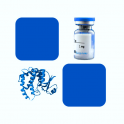
- Remove this product from my favorite's list.
- Add this product to my list of favorites.
Products
Viewed products
Newsletter
 |  |  |  |  |  |

Background
CTLA-4 (Cytotoxic T-Lymphocyte Antigen 4) is also known as CD152 (Cluster of differentiation 152), is a protein receptor that downregulates the immune system. CTLA4 is a member of the immunoglobulin superfamily, which is expressed on the surface of Helper T cells and transmits an inhibitory signal to T cells. The protein contains an extracellular V domain, a transmembrane domain, and a cytoplasmic tail. Alternate splice variants, encoding different isoforms. CTLA4 is similar to the T-cell co-stimulatory protein, CD28, and both molecules bind to CD80 and CD86, also called B7-1 and B7-2 respectively, on antigen-presenting cells. CTLA4 transmits an inhibitory signal to T cells, whereas CD28 transmits a stimulatory signal. Intracellular CTLA4 is also found in regulatory T cells and may be important to their function. Fusion proteins of CTLA4 and antibodies (CTLA4-Ig) have been used in clinical trials for rheumatoid arthritis.
Source
Recombinant Mouse CTLA-4, Fc Tag (CT4-M5256) is expressed from human 293 cells (HEK293). It contains AA Glu 36 - Phe 162 (Accession # NP_033973).
Predicted N-terminus: Glu 36
Molecular Characterization
This protein carries a human IgG1 Fc tag at the C-terminus.
The protein has a calculated MW of 40.6 kDa. The protein migrates as 55 kDa under reducing (R) condition (SDS-PAGE) due to glycosylation.
Endotoxin
Less than 1.0 EU per μg by the LAL method.
Purity
>95% as determined by SDS-PAGE.
Formulation
Lyophilized from 0.22 μm filtered solution in Tris with Glycine, Arginine and NaCl, pH7.5. Normally trehalose is added as protectant before lyophilization.
Reconstitution
See Certificate of Analysis for details of reconstitution instruction and specific concentration.
Storage
For long term storage, the product should be stored at lyophilized state at -20°C or lower.
Please avoid repeated freeze-thaw cycles.
This product is stable after storage at:
-20°C to -70°C for 12 months in lyophilized state;
-70°C for 3 months under sterile conditions after reconstitution.
Bioactivity
Please refer to product data sheet.
(1) "The microbial metabolite desaminotyrosine enhances T-cell priming and cancer immunotherapy with immune checkpoint inhibitors"
Joachim, Göttert, Sax et al
EBioMedicine (2023) 97, 104834
(2) Histopathologic Manifestations of Immune Checkpoint Inhibitor Therapy-Associated Gastrointestinal Tract Injury: A Practical Review"
Mitchell, Karamchandani
Surg Pathol Clin (2023) 16 (4), 703-718
(3) "In vivo macrophage engineering reshapes the tumor microenvironment leading to eradication of liver metastases"
Kerzel, Giacca, Beretta et al
Cancer Cell (2023)
Showing 1-3 of 13081 papers.
(1) "CTLA4‐Ig directly inhibits osteoclastogenesis by interfering with intracellular calcium oscillations in bone marrow macrophages"
Authors: Okada H, et al
Journal: J Bone Miner Res 43593
Application: Cell Culture
Recombinant human CTLA4/CD152 Protein, His Tag, 100µg - 221,00 €
Recombinant Human CTLA4 /CD152 Protein, With C-Fc Tag, 200µg - 260,00 €
Recombinant Cynomolgus / Rhesus macaque CTLA-4 Protein, His Tag, 200µg - 260,00 €
Recombinant Cynomolgus / Rhesus macaque CTLA-4 Protein, Fc Tag, 200µg - 260,00 €
Recombinant Biotinylated Cynomolgus / Rhesus macaque CTLA-4, Avi Tag (Avitag™), 25µg - 468,00 €
Recombinant Mouse CTLA-4 / CD152 Protein, His-Tag, 200µg - 260,00 €
Recombinant Biotinylated Human CTLA-4, Fc Tag, Avi Tag (Avitag™), 25µg - 338,00 €
Follow us